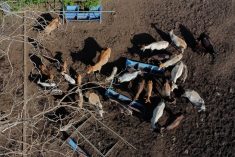Finning Cat needs 400 workers in each of the next four years just to maintain its workforce and western Canadian farmers are helping fill its bill.
The heavy equipment company has been growing steadily, tied in large part to expanding resource sectors in Alberta, British Columbia and northern Canada.
But the demands of growth are combining with an aging workforce to leave the company short of skilled tradespeople and other workers.
Greg McNeill of Finning in Edmonton has taken his recruiting drive on the road. McNeill is driving a logo covered black Hummer across the country visiting large and small cities and holding hiring seminars to get the attention of potential employees.
Read Also

Saskatchewan agriculture sector receives federal funding
PrairiesCan funding will assist in the continued growth of Saskatchewan’s ag research and manufacturing sectors.
He has also been as far away as Germany and South Africa to attract new employees to the company.
“We’re finding that trades with farm equipment experience are ideal for the type of equipment we maintain,” he said.
“They know about problem solving. They’ve worked on electrical systems, hydraulics and they’re great at diagnostics. Modern equipment needs good diagnosticians,” he said.
Finning’s shortage of workers has caused the company to create more flexible working arrangements that should help accommodate farmers, McNeill said.
“We are providing jobs today that allow for a cropping season, something that wasn’t really a consideration in the past,” he said.
The company is also moving its recruiting message into prairie high schools and trade colleges.
“We need to attract people to the trades and make them realize the great opportunities that are available that don’t require moving away from the West,” he said.
Statistics Canada reported in February that Alberta’s unemployment rate was down to 3.5 percent with trades levels below that.
Elsewhere in Canada, high oil and gas prices have had the opposite effect with 33,000 jobs being lost in Ontario in January, year over year.
Jason Myers, an economist with the Canadian Manufacturers and Exporters Association, said the job losses elsewhere in the country are of the types that don’t return when resource prices drop.
“There will be movement of workers from East to West in the next few years. It is where the work is. I expect this will also affect the way work is structured,” he said.
McNeill said his company has found that many eastern workers are choosing to work more continuous shifts then using time off to return to their eastern homes.
Air Canada recently announced plans for daily non-stop service from both Toronto and St. Johns, Nfld., to Fort McMurray, Alta.
“The nature of work is changing, so accommodating workers who choose to farm is just part of the future,” he said.














